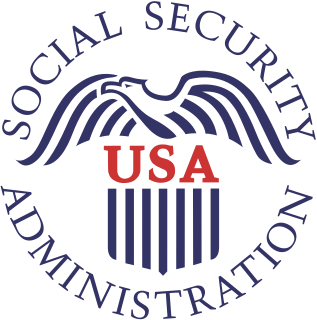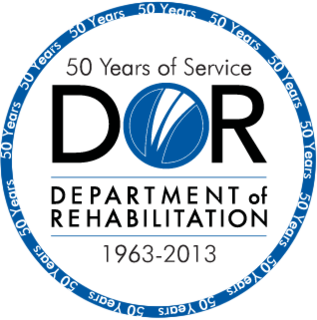Advocacy is an activity by an individual or group that aims to influence decisions within political, economic, and social systems and institutions. Advocacy can include many activities that a person or organization undertakes including media campaigns, public speaking, commissioning and publishing research or conducting exit poll or the filing of an amicus brief. Lobbying is a form of advocacy where a direct approach is made to legislators on a specific issue or specific piece of legislation. Research has started to address how advocacy groups in the United States and Canada are using social media to facilitate civic engagement and collective action.

The United States Social Security Administration (SSA) is an independent agency of the U.S. federal government that administers Social Security, a social insurance program consisting of retirement, disability, and survivors' benefits. To qualify for most of these benefits, most workers pay Social Security taxes on their earnings; the claimant's benefits are based on the wage earner's contributions. Otherwise benefits such as Supplemental Security Income (SSI) are given based on need.

The U.S. Railroad Retirement Board (RRB) is an independent agency in the executive branch of the United States government created in 1935 to administer a social insurance program providing retirement benefits to the country's railroad workers.
An administrative law judge (ALJ) in the United States is a judge and trier of fact who both presides over trials and adjudicates the claims or disputes involving administrative law.
Service and supports for people with disabilities are those government or other institutional services and supports specifically provided to enable people who have disabilities to participate in society and community life. Some such services and supports are mandated or required by law, some are assisted by technologies that have made it easier to provide the service or support and others are commercially available not only to persons with disabilities, but to everyone who might make use of them.

The Dictionary of Occupational Titles or D-O-T (DOT) refers to a publication produced by the United States Department of Labor which helped employers, government officials, and workforce development professionals to define over 13,000 different types of work, from 1938 to the late 1990s. The DOT was created by job analysts who visited thousands of US worksites to observe and record the various types of work, and what was involved. Innovative at the time, the DOT included information still used today in settling EEO and Workers Comp claims, like the physical abilities required to perform that occupation, and the time and repetitiveness of those physical actions.

The Selected Characteristics of Occupations (SCO) is a companion volume to the U.S. Department of Labor's Dictionary of Occupational Titles, Revised Fourth Edition, published in 1991. These volumes were intended to provide a detailed representation of thousands of individual occupations in the United States, for the purpose of occupational information, occupational exploration, and job placement.
The Federal Bar Association (FBA) is the primary voluntary professional organization for private and government lawyers and judges practicing and sitting in federal courts in the United States. Ten times a year, The Association prints The Federal Lawyer, which includes the latest news of interest to the federal legal community. The magazine features articles by attorneys and judges, book reviews, the latest Supreme Court rulings, judicial profiles, and thorough coverage of FBA activities.

The Coast Guard Judge Advocate General oversees the delivery of legal services to the United States Coast Guard, through the Office of the Judge Advocate General in Washington, the Legal Service Command, offices in the Atlantic and Pacific Areas, nine Coast Guard Districts, the Coast Guard Academy, three training centers, and a number of other activities and commands. Legal services are delivered by Coast Guard judge advocates and civilian counsel in ten legal practice areas: criminal law/military justice, operations, international activities, civil advocacy, environmental law, procurement law, internal organizational law, regulations and administrative law, legislative support and legal assistance.
Social Security Disability Insurance is a payroll tax-funded, federal insurance program of the United States government. It is managed by the Social Security Administration and is designed to provide income supplements to people who are physically restricted in their ability to be employed because of a notable disability, usually a physical disability. SSD can be supplied on either a temporary or permanent basis, usually directly correlated to whether the person's disability is temporary or permanent.
Richardson v. Perales, 402 U.S. 389 (1971), was a case heard by the United States Supreme Court to determine and delineate several questions concerning administrative procedure in Social Security disability cases. Among the questions considered was the propriety of using physicians' written reports generated from medical examinations of a disability claimant, and whether these could constitute "substantial evidence" supportive of finding nondisability under the Social Security Act.
CQL | The Council on Quality and Leis an American -based organization dedicated to the definition, measurement, and improvement of personal and community quality of life for people with disabilities and people with mental illness and substance abuse disorder and older adults. It has partnerships with organisations in Canada and the Republic of Ireland.
The United States Social Security Administration's Ticket to Work and Self-Sufficiency Program is the centerpiece of the Ticket to Work and Work Incentives Improvement Act of 1999. This voluntary program is designed to help people who are receiving disability benefits from Social Security "find good jobs, good careers, and better self-supporting futures." To be eligible for the program people must be ages 18 through 64 and receive Social Security Disability Insurance (SSDI) benefits under Title II of the Social Security Act and/or Supplemental Security Income (SSI) payments under Title XVI of the Social Security Act. The Ticket program provides these beneficiaries more choices for receiving employment and other support services they need to reach their work goal.
The Virginia Workers' Compensation Commission (VWC) is an agency of the U.S. state of Virginia that oversees the resolution of workers' compensation claims brought in that state, in accordance with the Virginia Workers' Compensation Act. The Commission has exclusive jurisdiction to adjudicate such claims. Its decisions may be appealed to the Virginia Court of Appeals. The Commission is headed by three Commissioners and an Executive Director. The Commissioners are chosen by the Virginia General Assembly and serve staggered six-year terms. R. Ferrell Newman, Wesley G. Marshall, and Robert A. Rapaport currently serve as Commissioners. The Commissioners elect a Chairman for a term of three years. Mr. Newman is currently the Chairman and Evelyn McGill is the Executive Director. The Commission is headquartered in Richmond, Virginia, but has offices and hearing locations at various places around the state.

The United States provides a wide range of benefits for veterans with posttraumatic stress disorder (PTSD), which was incurred in, or aggravated by, their military service. The United States Department of Veterans Affairs (VA) will provide benefits to veterans that the VA has determined suffer from PTSD, which developed during, or as a result of, their military service. These benefits not only include tax-free cash payments but can also include free or low-cost mental health treatment and other healthcare; vocational rehabilitation services; employment assistance; independent living support; and more.

The California Department of Rehabilitation (DOR) is a California state department which administers vocational rehabilitation services and provides support to independent living centers throughout the state. It provides vocational rehabilitation services, independent living services, and advocacy from over 113 locations throughout California seeking employment, independent living, and equality for individuals with disabilities. The DOR was established on October 1, 1963.

The Repeal of the "Implementation of the NICS Improvement Amendments Act of 2007" was legislation introduced in the United States House of Representatives on January 30, 2017 by Representative Sam Johnson of Texas. The bill repeals a rule issued by the Social Security Administration that would have required Federal agencies to identify individuals who receive disability insurance benefits under Title II of the Social Security Act or Supplemental Security Income and have been "determination by a court, board, commission, or other lawful authority that a person, as a result of marked subnormal intelligence, or mental illness, incompetency, condition, or disease: (1) Is a danger to himself or to others; or (2) Lacks the mental capacity to contract or manage his own affairs." in order to potentially prohibit such individuals from purchasing firearms or from having other purchase firearms on their behalf. The repeal was signed into law by President Donald Trump on February 28, 2017.

The President's Committee for People with Intellectual Disabilities (PCPID) is an advisory body that provides assistance to the President of the United States and the Secretary of Health and Human Services on public policy issues related to intellectual disability. It was started as a blue-ribbon panel by John F. Kennedy in 1961, and later reorganized through executive order into an official panel by Lyndon B. Johnson in 1966, with the goal of ensuring the right to a "decent, dignified place in society". Originally known as the President's Committee on Mental Retardation, it was eventually renamed in 2003 by George W. Bush over concerns regarding negative labelling. It was established through the work of Eunice Kennedy Shriver while serving as the head of the Joseph P. Kennedy Jr. Foundation.










